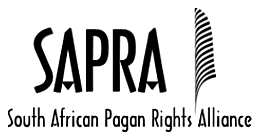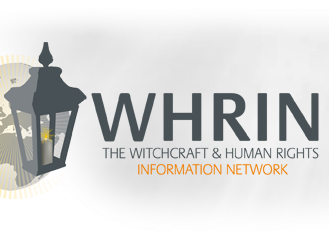Editorial Note: TWH uses quotations on “witches,” “witchcraft,” and “witch-hunt” to denote there appears no association with modern Pagan or Witchcraft practices. The victims of “witch-hunts” are usually not Pagans, Witches, or practicing any spiritual practice typically considered Pagan.
Note: Star Bustamonte contributed to this article.
GENEVA – The Human Rights Council of the United Nations adopted the charter for the “Elimination of harmful practices related to accusations of witchcraft and ritual attacks.” The adoption occurred during the forty-seventh session of the Council in a draft resolution sponsored by Cameroon on “behalf of the States Members of the United Nations that are members of the Group of African States.”

United Nations Human Rights Council logo
The resolution condemns the harmful practices associated with accusations of witchcraft and ritual attacks (HPAWR). It also comes just a little over a year after the murder of 90-year-old, Akua Denteh in Ghana drew global attention to “witch-hunts” in mostly developing nations.
The adoption of the resolution comes after years of advocacy. In 2014, the United Nations Department of Economic and Social Affairs noted that “witchcraft accusations that are used to justify extreme violence against older women are reported in 41 African and Asian countries, including Burkina Faso, Cameroon, India, Kenya, Malawi, Nepal and Tanzania. Older widows are often those most at risk.”
The report noted that “Older women are at particular risk due to widespread discriminatory attitudes and practices, UN Secretary-General Ban Ki-moon says in his message on World Elder Abuse Awareness Day. I call on Member States to enact and enforce stronger laws and strategies to address all aspects of this under-acknowledged social, public health and human rights issue.”
Conferences organized by UN experts on witchcraft and Human Rights were held on the issue of witchcraft assaults in 2017 and 2019. The conferences focused attention on the many attacks and murders perpetrated with witchcraft as a motivation and noted:
“In numerous countries around the world, witchcraft-related beliefs and practices have resulted in serious violations of human rights including, beatings, banishment, cutting of body parts, and amputation of limbs, torture, and murder. Women, children, the elderly, and persons with disabilities particularly persons with albinism, are particularly vulnerable. Despite the seriousness of these human rights abuses, there is often no robust state-led response. Often judicial systems do not act to prevent, investigate or prosecute human rights abuses linked to beliefs in witchcraft. This institutional failure perpetuates impunity.”
The human rights abuses are the result of weak justice and security as well as poverty inadequate access to healthcare and information. Religious profiteering is also a motivation. Women, children, the elderly, and people with disabilities including conditions such as dementia, epilepsy, and albinism have been targets of the Harmful Practices Related to Accusations of Witchcraft and Ritual Attacks (HPAWR).
HPWAR attacks are wide-ranging and can impact families and communities. They can include isolation and exploitation but include human trafficking, murders for body parts, grave-robbing, and mutilations.
The South African Pagan Rights Alliance issued the following statement regarding the announcement of the resolution:
The United Nations Human Rights Council’s draft resolution 47 entitled “Elimination of harmful practices related to accusations of witchcraft and ritual attacks” finally, although indirectly only, acknowledges that Witchcraft is not the mischief requiring regulation or prohibition. The draft correctly identifies the true harm; the human rights abuses which flow from accusations of witchcraft.
The South African Pagan Rights Alliance is pleased that point 6 of the draft has emphasised that “States should carefully distinguish between harmful practices amounting to human rights violations related to accusations of witchcraft and ritual attacks, and the lawful and legitimate exercise of different kinds of religion or beliefs, in order to preserve the right to freely manifest a religion or a belief, individually or in a community with others, including for persons belonging to religious minorities”.
This clause affirms the right of Witches to freedom of religion. The right to freedom of religion is already a Constitutionally protected right in South African law.
The South African Pagan Rights Alliance will be forwarding the draft resolution to the South African Law Reform Commission, and to the Minister of Justice and Constitutional Development.
We trust that international consensus on this issue will persuade the Law Reform Commission to revisit it’s hesitancy to recommend that the Legislature set aside the Witchcraft Suppression Act as clearly inconsistent with both Constitutional and International law.
This Alliance would like to extend its gratitude to Gary Foxcroft, the Executive Director of the Witchcraft & Human Rights Information Network (WHRIN), for allowing the South African Pagan Rights Alliance to contribute to this momentous and important achievement as a participating member of WHRIN.

The Wild Hunt previously reported on the United National resolutions the workshops and produced a series on the epidemic of witchcraft-based assaults. In 2019, the UN signaled condemnations of witchcraft-linked killings of ten children in Tanzania. And beginning in 2020, the COVID-19 brought increased assaults based on witchcraft accusations, “One unwelcome impact is how it has driven up the cases of ‘witch-hunts’ which are fueled by ignorance, superstitions, and the belief in malignant magical practices.”
The (WHRIN) a coalition of survivors, non-governmental organizations, academics, and lawyers that promotes the awareness of human rights violations that are committed due to the belief in witchcraft, issued a statement celebrating the adoption of the resolution.
“Following 6 years of intensive advocacy by a coalition of survivors, NGOs, academics and lawyers, the UN Human Rights Council has passed a ground-breaking resolution, which ’emphatically condemns harmful practices related to accusations of witchcraft and ritual attacks that result in human rights violations,’ said Ms. Ikponwosa Ero, UN Independent Expert on the enjoyment of human rights by persons with albinism.”
Lancaster University’s Dr. Charlotte Baker and Gary Foxcroft, Director of the Witchcraft and Human Rights Information Network (WHRIN) said: “Reported data shows that in the last decade that there have been at least 20,000 victims of these harmful practices across 50 countries and 6 Continents who have faced extreme human rights violations including loss of life, limbs and property due to harmful practices. Today marks an important step towards delivering justice for them and preventing more abuses.”
The WHRIN press release included a statement from Mariamu Staford of Tanzania. Staford has albinism and was attacked in 2008 by two men who cut off her arms to sell. Staford survived and identified her attackers who were arrested and never convicted. Her village disowned her for her bravery saying she had brought shame to them.
 Staford said, “The UN resolution gives me personal hope, as a victim of these harmful practices, that one day justice will be served and they will end. Even better, the resolution ensures that people with albinism, who haven’t been victims are protected from such harmful practices. I pass my sincere gratitude to the UN for this landmark resolution that will ensure equity, equality and dignity for all people with albinism.”
Staford said, “The UN resolution gives me personal hope, as a victim of these harmful practices, that one day justice will be served and they will end. Even better, the resolution ensures that people with albinism, who haven’t been victims are protected from such harmful practices. I pass my sincere gratitude to the UN for this landmark resolution that will ensure equity, equality and dignity for all people with albinism.”
The UN resolution reaffirmed “the fundamental principles of equality, non-discrimination and human dignity that underlie the Charter and international human rights instruments” noting the “everyone has the right to life, liberty and security of person and that no one shall be subjected to torture or to cruel, inhuman or degrading treatment or punishment” and “the universality, indivisibility, interdependence and interrelatedness of all human rights and fundamental freedoms and the need for all to be guaranteed the full enjoyment of all human rights and fundamental freedoms without discrimination of any kind.”
The UN resolution is an important and welcome step in eliminating witchcraft assaults but its enforceability as a matter of security is limited. The resolution “Urges States to condemn harmful practices related to accusations of witchcraft and ritual attacks that result in human rights violations” and take appropriate measures to ensure the protection of its citizens from HPAWR.
The UN resolution requests that the United Nations High Commissioner for Human Rights organize expert consultation on HPAWR from the UN Secretariat and all appropriate organizations and individuals with expertise in the matter.
The resolution also makes note that there are religious minorities whose practices are peaceful and legitimate.
As SAPRA pointed out in their statement, the relevance and importance to legitimate minority religions like Pagans is of the inclusion within the UN resolution is the statement, “States should carefully distinguish between harmful practices amounting to human rights violations related to accusations of witchcraft and ritual attacks, and the lawful and legitimate exercise of different kinds of religion or beliefs, in order to preserve the right to freely manifest a religion or a belief, individually or in a community with others, including for persons belonging to religious minorities.”
The Wild Hunt is not responsible for links to external content.
To join a conversation on this post:
Visit our The Wild Hunt subreddit! Point your favorite browser to https://www.reddit.com/r/The_Wild_Hunt_News/, then click “JOIN”. Make sure to click the bell, too, to be notified of new articles posted to our subreddit.